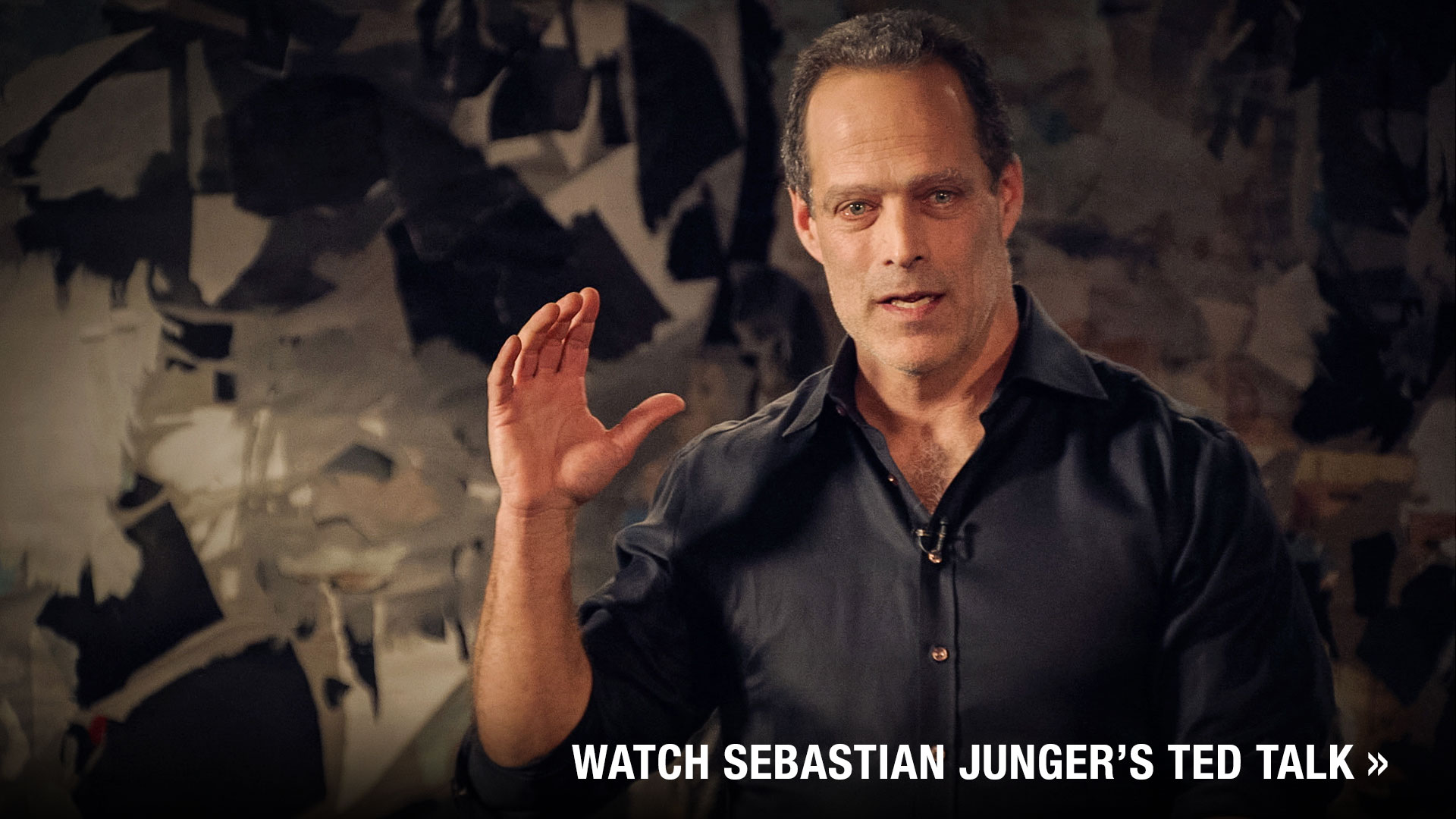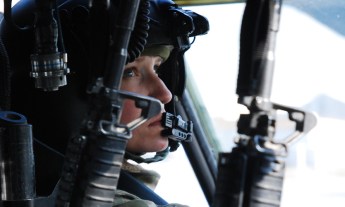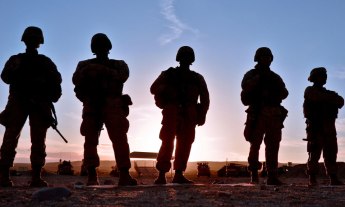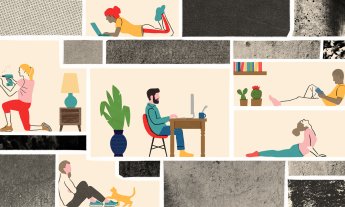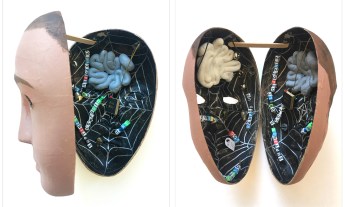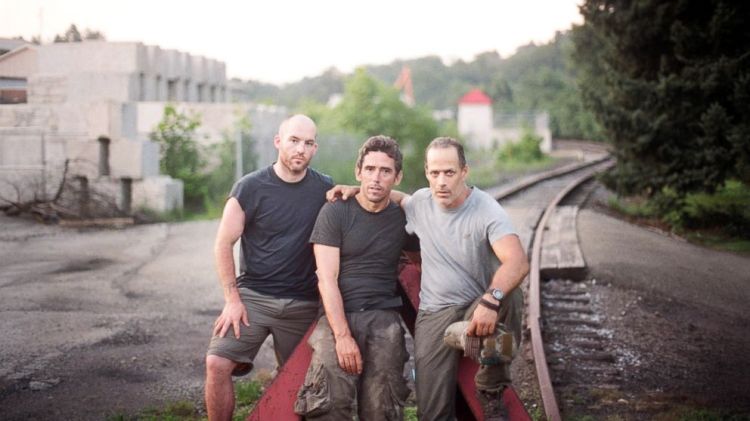
Veterans often have a hard time returning to civilian life after war. Sebastian Junger offers a counterintuitive theory about why.
In his film, The Last Patrol, Sebastian Junger thinks on why veterans sometimes have a hard time re-entering civilian life. The theory he is working on: It’s hard to go from a tight-knit human experience — eating together, sleeping together, relying on one another for everything — to the loose-knit bonds of everyday life. He wonders if the discordance that soldiers experience isn’t so much about something broken in them, but about something broken in society at large.
The author of The Perfect Storm, Junger is well known for his work as a magazine journalist and author. But in 2007, when he spent a year with a platoon in Afghanistan’s Korengal Valley, he decided to capture the experience on video. The footage — filmed within a six-mile strip that saw nearly 20 percent of all combat in Afghanistan — became the documentary Restrepo, which captured the visceral experience of war and was nominated for an Oscar in 2011. Junger followed it up with Korengal, a documentary that looked at the same soldiers in the same valley but shifted the focus to the effects of war on individuals. The Last Patrol — which aired on HBO — is the final film in this trilogy and focuses on the return from war. In it, Junger sets off on a 350-mile trek across the United States with two of the veterans who appear in the previous films and a war photographer. As they travel along railroad tracks, they reflect on their experience and get to know America again.
The thing that’s most surprising to civilians is that soldiers actually miss the war.
We called Junger to talk to him more about the ideas at the heart of his film. Below, an edited transcript of that conversation.
First off, for The Last Patrol, why did you decide to travel along railroad tracks?
I wanted to encounter America in the rawest way I could. Railroad tracks go straight through the middle of everything. It’s often a sort of no-man’s-land on either side, so it seemed like there’d be good places to sleep. We didn’t have tents, so we needed shelter under bridges or in the woods.
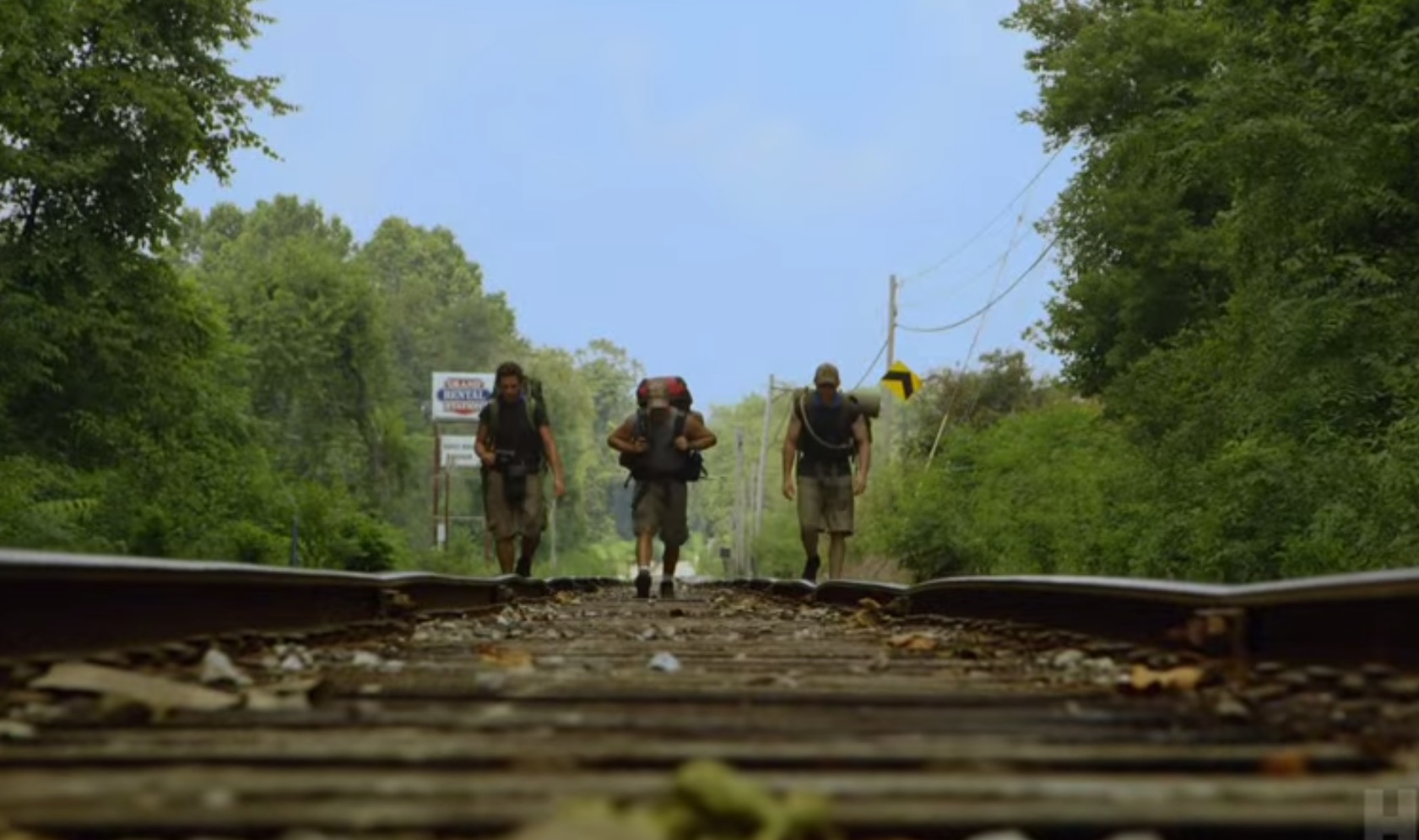
Did getting to know America again feel as important for you as for some of your fellow travelers?
There were four of us. Two former soldiers [Brendan O’Byrne and Dave Roels], who’d both been overseas a lot, and Guillermo [Cervera], a Spanish photojournalist. I told him that he would get to see America from a perspective that no other photographer has. For me, I grew up in Boston, I live in New York City and most of my reporting is done overseas. I’m from a part of America that a lot of America doesn’t think is America. So yeah, I’ve missed some sort of American experience. Walking on these railroad lines definitely put me square in the center of something that I’d never experienced before.
The journey was about transitioning from war to civilian life. What are the most surprising things about that transition?
The thing that’s most surprising to civilians is that soldiers actually miss the war. That’s surprising to wives, parents, friends. For the men themselves — and I’m just saying “men” because it was all men that I was out there with in Afghanistan — I think they come back and are shocked that they don’t fit in very well to American life anymore. It’s very confusing for them. One of the things that I wanted to do with this trip is reproduce some of the physical hardships of being in a war zone. To reproduce some of the tactical challenges — needing water, having to stay out of sight, avoiding the police. These challenges were fun to solve, because they reminded all of us of combat.
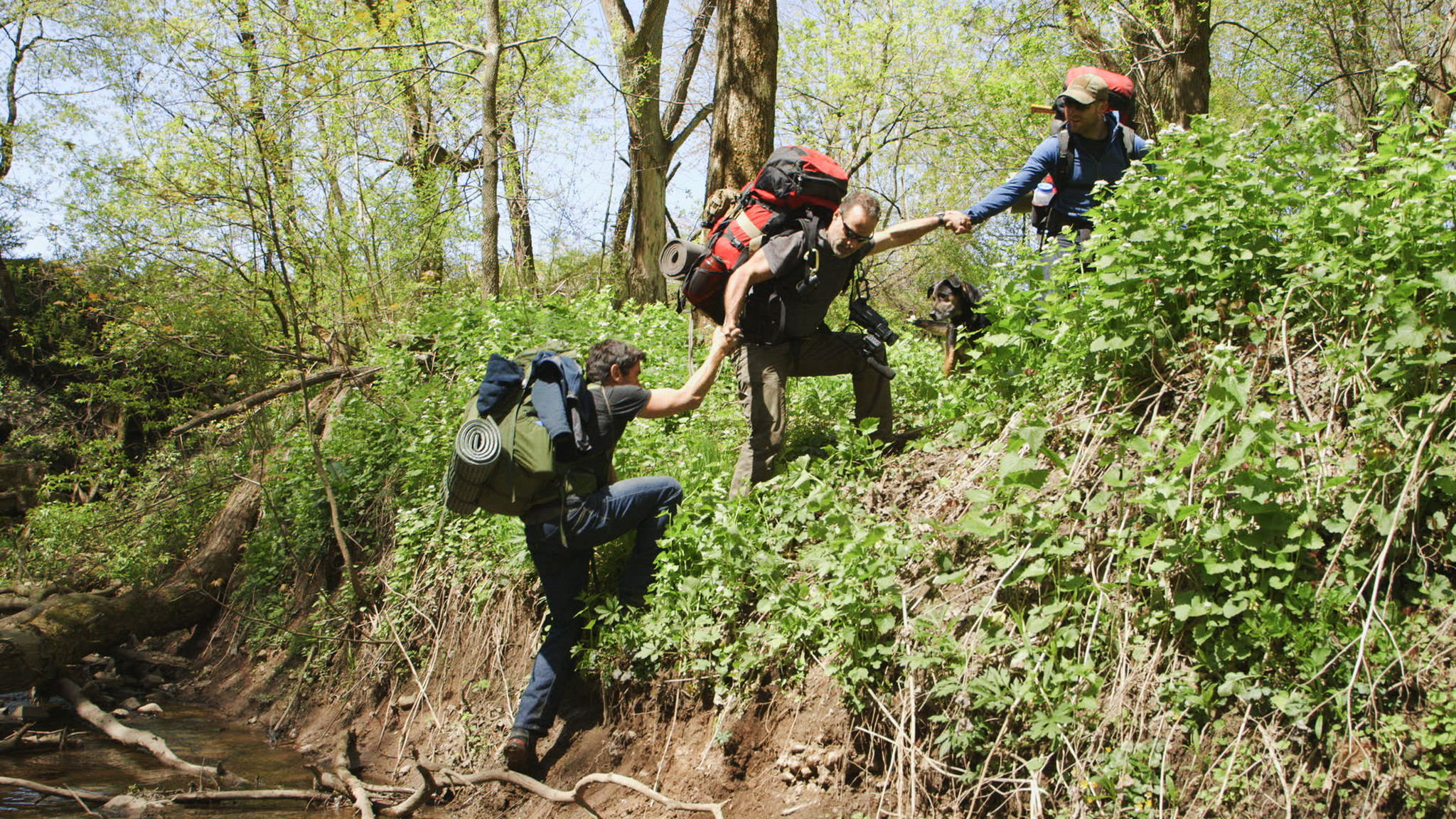
Was self-sufficiency part of it? What were some of the solutions you came up with?
It’s always appealing to have everything that you need on your person or in a pack. You can pick up and go anywhere, and then set yourself down and make a temporary place to spend the night. We hit Philadelphia and decided, instead of going on to New York, to turn west and head for Pittsburgh. The idea that we had the freedom to do that is pretty intoxicating. We didn’t have a support team — we were out there on our own, and we had everything we needed. It was a tremendous feeling.
As a species, we evolved to sleep in groups and do everything in close proximity with other people.
Was there a night when you just wanted to be done with the trek?
Honestly, every night. We spent the entire time bitching about it, wishing we weren’t doing it. We had some very nice evenings, but you have to understand how physically hard it was. We were constantly exhausted — achy, sore, hungry, miserable. It was physically brutal. We had a couple of idyllic campsites, but my god, mostly it was rough. We broke it up into chunks — walking a little bit in each season. We were carrying a lot of weight, and we just couldn’t have walked 350 miles straight without resting. Plus, breaking it up allowed us to experience different kinds of challenges. The winter was extremely cold in Pennsylvania — it was 15 degrees at night, and really windy. Then in the summer, we walked through a brutal heat wave. It was 100 degrees in the shade and we had two quarts of water an hour. We were just staggering along. It was ghastly.
You’ve said that this film is about the importance of human closeness. In what ways do you feel like that’s something we’ve lost?
I think we’ve completely lost it. We have it within families and in friendships, but we don’t live in any sort of communal fashion. As a species, we evolved to sleep in groups, and do everything in close proximity with other people. Groups of 30 or 40 people was pretty standard for our early hunter-gatherer ancestors and, all of a sudden, we’re living in little boxes alone or with a couple of people, not doing anything communally. I think it’s making us miserable. The rate of suicide, depression, insomnia, anxiety, loneliness, self-abuse — Western industrial society has produced the highest levels in human history. I think soldiers come back from war, where they’ve had a very, very close and connected human experience, and they’re shocked at how alienating this society actually is.
You don’t have any privacy in the army, which sounds horrible, but actually makes everybody feel really good.
What helped you to connect the dots, to see that moving between these modes of life is what’s so difficult for soldiers?
I studied anthropology in college, so I tend to see things through that lens. People take modern, urban society to be not only normal, but actually the final culmination of our existence. But actually, we’re not psychologically very well-adapted to it at all.
It was actually in doing a Q&A session for my TED Talk that someone asked, “Why do soldiers have such trouble fitting in when they come home?” And the lightbulb just went off for me. I said, “Well, I think maybe it’s not that they’re messed up — it’s that we’re actually messed up.” As a society. They’ve had such an ancient human experience in that platoon of 40 men, and they’re shocked when they come home. The idea came to me while answering questions, and then I started researching it. I started talking to anthropologists about mental health issues, and I confirmed it.
In terms of human history, it’s not a normal thing to go back to a single-family dwelling, where everyone’s sleeping in their own room.
What are some ways we can find, in our everyday lives, to get that human closeness?
I think it’s going to be hard. We’d need to dismantle the suburbs and radically restructure society, and I don’t think we’re going to do that. But I do think that, as our society starts to get hit by increasing numbers of crises — like drought and wildfire, and climate change and storms — it’s possible that, community by community, some kind of group action — group thought — will emerge to help us through. That could give us that connected feeling again. I know even in New York City after Hurricane Sandy, it was this terrible event, but people were sort of blissed out by being so cooperative and connected with everybody else. I’ve also heard that Londoners were very nostalgic about the Blitz, when everyone lived in the subway tunnels. People actually missed those days, hard as they were.
Besides the military, are there any spaces in our current society where people are doing a good job of keeping closeness?
There are communities, yes. But a big thing is living and sleeping together in groups. I mean, there are small towns where people are very engaged with each other, but in terms of human history, it’s not a normal thing to go back to a single-family dwelling, where everyone’s sleeping in their own room. We have a whole society that’s been raised like that, and I think it really affects how we are. But in a platoon, you’re sleeping with 20 other guys. You don’t have any privacy in the army, which sounds horrible, but actually makes everybody feel really good. There are stresses, obviously, but that is how we have lived for the first 99% of human history. It feels good.
People feel shy around soldiers. They don’t want to say the wrong thing.
Switching directions a bit, what sparked your interest in filmmaking?
I knew I was going to be out with this platoon for a year, and I thought if I’m going to spend that much time out there, I might as well shoot a lot of video and maybe make a documentary out of it. It was a “let’s see how this goes” kind of thing. Video’s pretty easy to shoot, and you can capture situations that are hard to really get with a pen and paper. They’re just too fast-moving to capture in your notebook. Certainly with Restrepo and Korengal, a lot of soldiers tell me that I really captured the experience of combat. I’m very curious what they’ll think of The Last Patrol. I think some of the issues we discuss on the trip will really resonate.
Last year, you spoke in the TED office and, the same night, we also heard a talk from Wes Moore called “How to talk to veterans about the war,” about how there’s a general unwillingness among civilians to ask veterans questions. How do your ideas work together?
I do think people feel shy around soldiers. They don’t want to say the wrong thing, they don’t want to trigger a bad memory. They just don’t know what to say. I also think people just don’t want to hear about ugly stuff. I think that’s half of the problem.
The public and the military are not talking about this stuff. The fault is really on both sides.
Then with soldiers, you hear over and over again, “I can’t tell you what it’s like — you can’t know unless you’ve been there.” Soldiers aren’t really pushing hard to have a full, open conversation either. “You’d never understand unless you’d been there, so I’m not going to bother trying to explain it to you.” I mean, I get it — but they’re half of the equation too.
So the public and the military are not talking about this stuff. The fault is really on both sides.
Did you set out to bridge the two worlds with these documentaries?
With Restrepo, I wanted to make people understand the kind of war we were in — how tough it was. With Korengal, I wanted to get soldiers to think about how the experience had affected them. And with The Last Patrol, I wanted to demonstrate one way of achieving really powerful group closeness as part of a re-entry process. I don’t know if bridging the gap is quite what I was trying to do, but I was trying to make the issues more understandable to everybody, including soldiers.
Will your next project be war-related?
No, I’m done with covering war. I really don’t know what the next thing is. I would tell you if I did, but I don’t. We’ll see.
Featured image by Guillermo Cervera/HBO.

